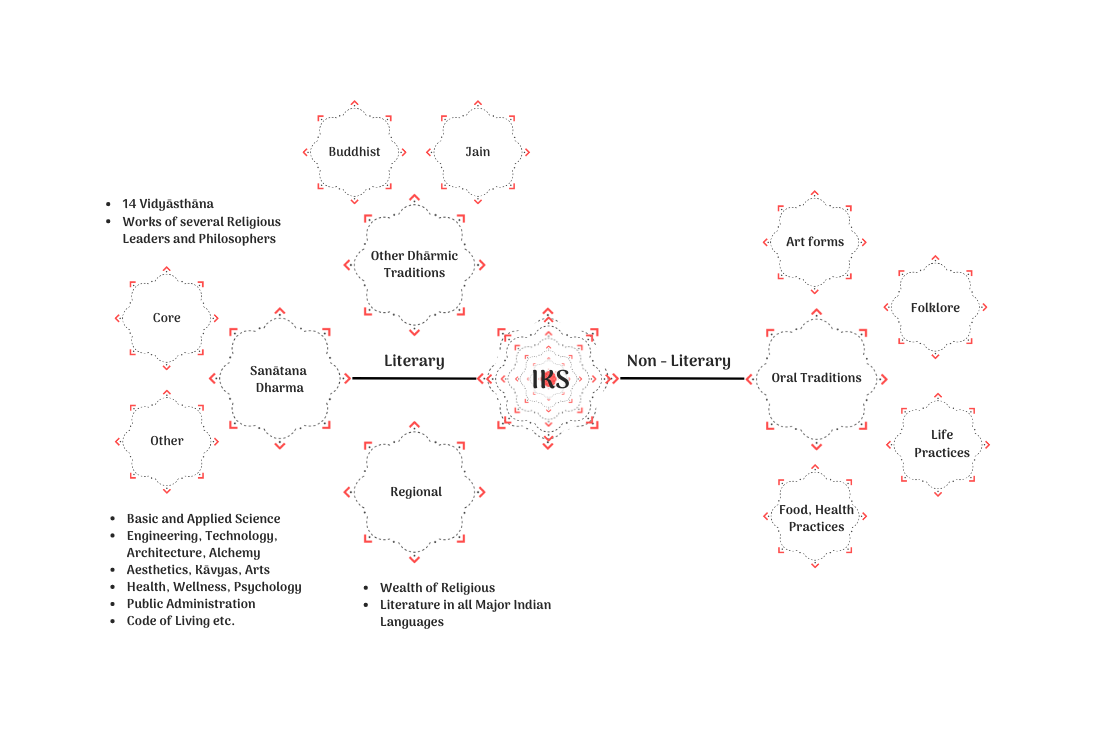The Vast Indian Knowledge Repository
The vast Indian knowledge repository includes fields as diverse as philosophy, architecture, grammar, mathematics, astronomy, metrics, sociology (dharmashastra), economy and polity (arthaśāstra), ethics (nītiśāstra), geography, logic, military science, weaponry, agriculture, mining, trade and commerce, metallurgy, mining, shipbuilding, medicine, poetics, biology and veterinary science. Even with the colonialism of Islamic and European type and destruction that these texts saw they have sustained all these years.
Further the tradition discusses 18 major vidyās theoretical disciplines and 64 kalās vocational sciences. These are classified as follows: Four Vedas, the four subsidiary Vedas (āyurveda medicine), dhanurveda (weaponry), gaṃdharvaveda (music) and śilpa (architecture), purāṇa, nyāya, mīmāṃsā, dharmaśāstra and vedāṃga, the six auxiliary sciences, phonetics, grammar, metre, astronomy, ritual and philology.

We have to make use of this vast repository for an “epistemological imagination aimed at refounding the political imagination… to strengthen the social struggles against domination” (Santos, 2018). The task should be to transform Indian Knowledge Systems (IKS) from absent subjects into present subjects as a primary condition for identifying and validating knowledges capable of reinventing themselves. The IKS-based knowledge should be directed towards eliminating the epistemic violence towards Indic studies, expressed by Cesaire in the context of Caribbean: “millions of men torn from their gods, their lands, their habits, their life, from life, from the dance, from wisdom” (1995).
As SN Balagangadhara argues in his book, ‘What does it mean to be “Indian”?’, that Indian culture transmitted knowledge without popularizations, vulgarizations, and without dumbing down ideas. The issue is not how to popularize knowledge but how to make it maximally accessible to people. The challenge before us is to revive these traditions. But for this to happen, we need three things: (a) an intellectual visibility and social respectability required to attract excellent young minds for research, (b) a system of rewards and incentives that make it worthwhile, (c) a training not only in doing research but also publishing it in good places.
This would entail finding people willing to challenge the received view, and actively supplant it. This would require producing literature of two kinds: (a) the debunking kind, and (b) that which provides new and novel conceptualizations of different aspects of Indian culture.
This means that serious and systematic research must be undertaken by many different people on many different themes. So, one must look to recruit younger, gifted people willing to do such research.
For India to regain its preeminent position in the world, it would be necessary for the country to rediscover and reinvigorate its intellectual traditions, as well as its cultural vitality, and to re-establish the roles that sites such as temples played in the transmission of knowledge. As a nation that has a rich knowledgeable past dating back over millennia, not just centuries, India should strive to become a knowledge hub to better its position in the world. The land that was once home to Taxila, Nalanda, and countless other institutions and knowledge traditions ought to once more play a central role in the production of knowledge and its dissemination. It is imperative that we never forget that colonialism led to the loss of access to our knowledge traditions, which in turn caused us to lose our sense of pride and confidence in ourselves. As Sri Aurobindo wrote to his brother Barin Ghosh in 1920, saying; “The chief cause of the weakness of India is not subjection nor poverty, nor the lack of spirituality or dharma, but the decline of thought-power, the growth of ignorance in the motherland of Knowledge. The modern world is the age of the victory of Knowledge.”